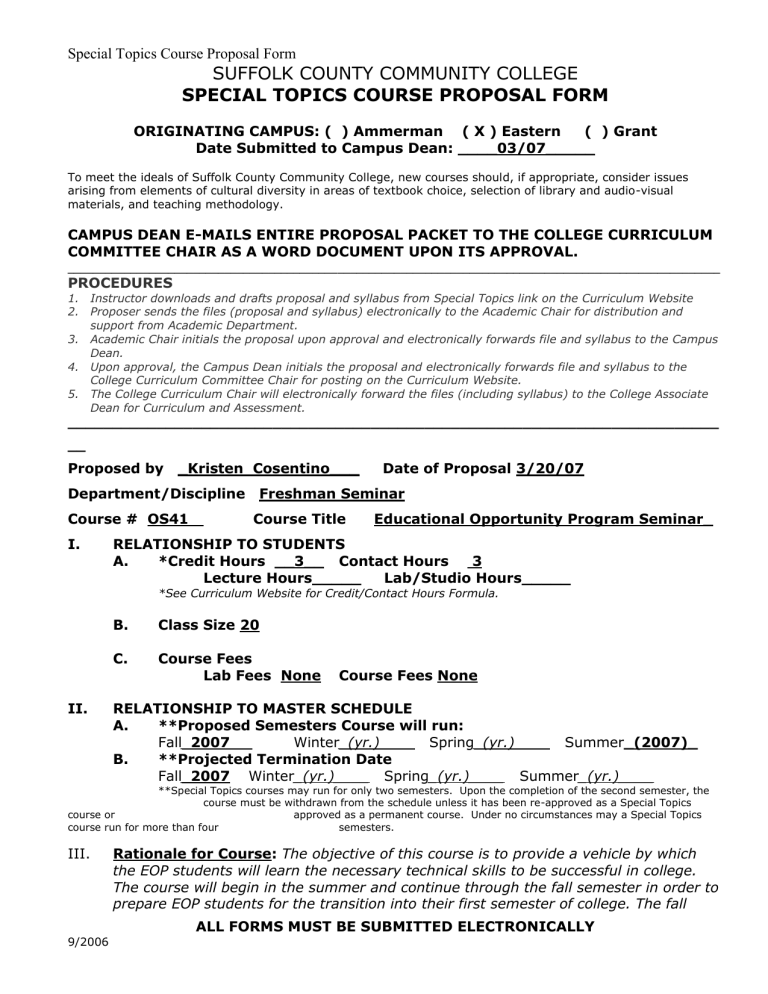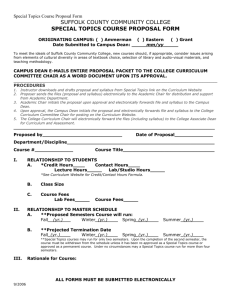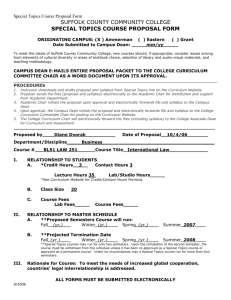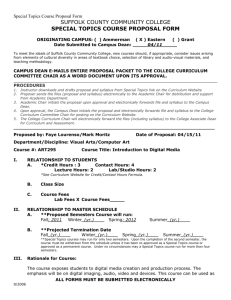OS41 - Suffolk County Community College

Special Topics Course Proposal Form
SUFFOLK COUNTY COMMUNITY COLLEGE
SPECIAL TOPICS COURSE PROPOSAL FORM
ORIGINATING CAMPUS: ( ) Ammerman ( X ) Eastern ( ) Grant
Date Submitted to Campus Dean: ____03/07_____
To meet the ideals of Suffolk County Community College, new courses should, if appropriate, consider issues arising from elements of cultural diversity in areas of textbook choice, selection of library and audio-visual materials, and teaching methodology.
CAMPUS DEAN E-MAILS ENTIRE PROPOSAL PACKET TO THE COLLEGE CURRICULUM
COMMITTEE CHAIR AS A WORD DOCUMENT UPON ITS APPROVAL.
________________________________________________________________________________________________________
PROCEDURES
1.
Instructor downloads and drafts proposal and syllabus from Special Topics link on the Curriculum Website
2.
Proposer sends the files (proposal and syllabus) electronically to the Academic Chair for distribution and support from Academic Department.
3.
Academic Chair initials the proposal upon approval and electronically forwards file and syllabus to the Campus
Dean.
4.
Upon approval, the Campus Dean initials the proposal and electronically forwards file and syllabus to the
College Curriculum Committee Chair for posting on the Curriculum Website.
5.
The College Curriculum Chair will electronically forward the files (including syllabus) to the College Associate
Dean for Curriculum and Assessment.
_________________________________________________________________________
__
Proposed by _Kristen Cosentino___ Date of Proposal 3/20/07
Department/Discipline Freshman Seminar
Course # OS41 Course Title Educational Opportunity Program Seminar_
I. RELATIONSHIP TO STUDENTS
A. *Credit Hours __3__ Contact Hours 3
Lecture Hours_____ Lab/Studio Hours_____
*See Curriculum Website for Credit/Contact Hours Formula.
B.
C.
Class Size 20
Course Fees
Lab Fees None Course Fees None
II. RELATIONSHIP TO MASTER SCHEDULE
A. **Proposed Semesters Course will run:
Fall_2007 __ Winter_(yr.)____ Spring_(yr.)____ Summer_(2007)_
B. **Projected Termination Date
Fall_2007 Winter_(yr.)____ Spring_(yr.)____ Summer_(yr.)____ course or
**Special Topics courses may run for only two semesters. Upon the completion of the second semester, the course must be withdrawn from the schedule unless it has been re-approved as a Special Topics course run for more than four approved as a permanent course. Under no circumstances may a Special Topics semesters.
III.
Rationale for Course: The objective of this course is to provide a vehicle by which the EOP students will learn the necessary technical skills to be successful in college.
The course will begin in the summer and continue through the fall semester in order to prepare EOP students for the transition into their first semester of college. The fall
ALL FORMS MUST BE SUBMITTED ELECTRONICALLY
9/2006
Special Topics Course Proposal Form component is designed to keep cohesion among the group and to engage them in activities that would be beneficial to their continued success at the college.
IV. Description of Course:
The students will attend a summer component 4 days a week (an hour and 15 minutes each session) for 4 weeks. The topics covered will include test taking strategies, note taking, time management, money management, goal setting, learning styles, critical thinking, understanding of the college catalogue/handbook, campus orientation, library unit and self reflection through journaling. In addition, the personal and societal issues faced by first year college students will be explored. Upon completion of the summer component, EOP students will be retested on the college placement exam to ascertain appropriate college level or pre-college level course selection.
In addition, students will meet once a week during common hour in the fall semester. Integration is key and it is important that students get involved with campus life and activities that will develop leadership skills. Some activities that will be incorporated into the fall component include multi-cultural programs, participation in clubs, attending special events on campus (transfer day, career & health fairs), scholarship information provided by the financial aid office, as well as distinguished lecturers discussing topics such as HIV/AIDS, drug/alcohol abuse, and stress management.
This course can be used to substitute the required freshman seminar course OS20 since EOP students are considered developmental.
V. Approvals
Department Approval: Faye Lourenso
Academic Chair
Campus Dean Approval Philip H. Christensen
Campus Dean
Date 3/22/07
Date 3/36/07
9/2006
ALL FORMS MUST BE SUBMITTED ELECTRONICALLY
Special Topics Course Proposal Form
SPECIAL TOPICS • COURSE SYLLABUS
I. Course Number and Title:
OS41 Educational Opportunity Program Seminar
II. Description of Course:
This course consists of a summer and fall component. EOP students will learn the necessary technical skills for college success such as study skills, library use, test taking strategies, goal setting and time management during the summer portion. The fall component incorporates an integration into the college community by student’s active participation in campus activities and clubs.
III. Course Objectives:
(What should students learn as a result of taking this course and how will they demonstrate that learning?)
This course is designed to give EOP students the opportunity to gain an understanding of themselves as well as the educational process at the college to better prepare them for their first year college experience.
Upon completion of this course students will be able to:
1.
understand the policies and procedures of the college as well as the resources and services provided.
2.
explore personal and societal issues faced by students (i.e. alcohol/drug abuse, sexuality, cultural diversity, etc.)
3.
define short-term as well as long-term goals, within the professional and educational spheres (i.e. career development and academic advisement).
4.
understand time, money and stress management.
5.
acquire effective study and test taking strategies..
6.
acquire problem solving skills through analysis and critical thinking to promote active learning .
7.
develop interpersonal skills through interaction in group activities.
8.
become familiar with and learn to use the college’s library, homepage and resources.
9.
understand how to read a SAIN report and plan academic future.
10.
successfully integrate into the campus/college community by participating in campus life and availing themselves to leadership opportunities.
IV. materials
Required Texts and Materials:
(List textbooks, newspapers, journals, Internet resources, CD-ROMS, Videos, other teaching to be used in the course.)
Becoming a Master Student with Activities, Tenth Edition
Concise Version by Dave Ellis
Student Handbook
Journal
V. objectives.)
Assessment of Student Learning:
(Describe assessment measures, i.e., instruments that measure the attainment of course
Student Requirements for Completion of the Course:
ALL FORMS MUST BE SUBMITTED ELECTRONICALLY
9/2006
2 nd Week
Special Topics Course Proposal Form
Students are expected to complete the following requirements in order to receive credit for the course.
1.
Attendance.
Students are expected to attend all classes. Students will be responsible for completing any assignments during their absence. Assignments are expected to be on time.
2.
Campus Activities Report. Students are required to attend one or more campus activities and write a brief paper based on an academic rubric (e.g. a lecture, concert, club meeting, etc.)
3.
Complete Library Unit
4.
Complete Resource Project
5.
Complete Autobiography
6.
Attend all orientation classes (Academic Skills Center and Computer Center).
7.
Complete all journal entries, homework and classroom assignments
VI.
1 st Week
Weekly Outline of Topics and Assignments:
Introduction & Course Requirements
Ice Breaker
What Makes a Successful College Student (Defuzzing Wheel)
What to expect from course & college
Textbook Reconnaissance
Homework: Read Chapter 1, pg. 1-13
Homework: Autobiography Past to Present
Learning Styles: What are they?
Learning Style Inventory & Assessment
Discovery Wheel
Telling the Truth About Yourself Activity
Journal: Transitions
Dealing with changes, Activities, pp. 1-3
Homework: Monitor Time for one week, pp. 30-34
Goals
Defining Long Term & Short Term Goals (letter to self)
Goals: Group Activity
Homework: Read Chapter 2, pp 39-54
Academic Plan
(SAIN reports)
Homework: Autobiography Goal Setting
Homework: Read Chapter 2, pp 55-69
MEET IN SKILLS CENTER ORIENT ROOM 233
****TIME MONITORS DUE****
Time Management
How do you spend your time? Time Wasters (Group)
Are you a procrastinator?
Are you studying enough?
Planning/Prioritizing: Ways to save time
Journal, p.36
ALL FORMS MUST BE SUBMITTED ELECTRONICALLY
9/2006
3 rd Week
4 th Week
Special Topics Course Proposal Form
Discussion, p. 35
Homework: Autobiography Course Expectations
Homework: Campus Resource Project
Homework: Review College Catalog & Handbook
MEET IN LIBRARY
Homework: Read Chapter 3 pg. 71-87
***CAMPUS RESOURCE DUE****
Memory
Techniques for better grades
Journal pg. 71 text
Group Work: Scavenger Hunt
Short & Long Term Memory Assessments
Mnemonic Devices
Homework: Autobiography Suffolk County Community College
MEET IN COMPUTER CENTER
Homework: Read Chapter 4 pg. 89-109
Reading
Muscle Reading
Learning Styles Application
Short Movie
Journal, p.45
Test Taking
Homework: Read Chapter 5, pp. 107-125
Homework: Reaction Paper to movie
Homework: Autobiography About M
Note Taking
Cornell, Mind Maps, Outline & Fishbone
Journal, p. 107 text
How to Take Lecture Notes
Observe, Record & Review
Homework: Monitor Spending
Homework: Finish Library Assignment
***LIBRARY ASSIGNEMENT DUE***
Listening
Group: The Accident
Listening Before Reacting: The Cabby
Listening & Note taking: Circle & Lines
Listening: Key Words, Phrases & Hints
Homework: Read Chapter 6pp. 127-149
Strategies for before and during test taking
ALL FORMS MUST BE SUBMITTED ELECTRONICALLY
9/2006
5 th Week
Special Topics Course Proposal Form
Test Anxiety Assessment
Learning Style Application
Homework: Autobiography Advice
Creative Writing Process
Red Robin Journal
Plagiarism
Power Writing
Writing & Giving Speeches
Homework: Read Chapter 7pp. 172-185
*****MONEY MONITORS DUE****
Money Management
Monthly Income & Income Needs
Discretionary Income Assessment
Journal: p. 44 activities
Values
Value Auction: Group Activity
Homework: Read Chapter 7pp. 185-199
Thinking
Critical Thinking
Drawbridge Group Exercise
Decision Making
Problem Solving
Journal: Discovery Statement p. 168
Homework: Read Chapter 9pp. 201-215
*****AUTOBIOGRAPHIES DUE*****
Communication
Relationships
Self Esteem & Motivation
Journal & group discussion activities pp.7-14
Homework: Read Chapter 9pp. 201-215
What’s Next? Planning for your future
Transferring
Resources
Speaker from Transfer Services
Journal: Activity Book, pp. 65-70 Planning Your Future
Career Planning
Resume Writing
Your career self study
Do I want a job or a career
Speaker from Career Services
Homework: Get a good night sleep CPT TOMORROW
ALL FORMS MUST BE SUBMITTED ELECTRONICALLY
9/2006






